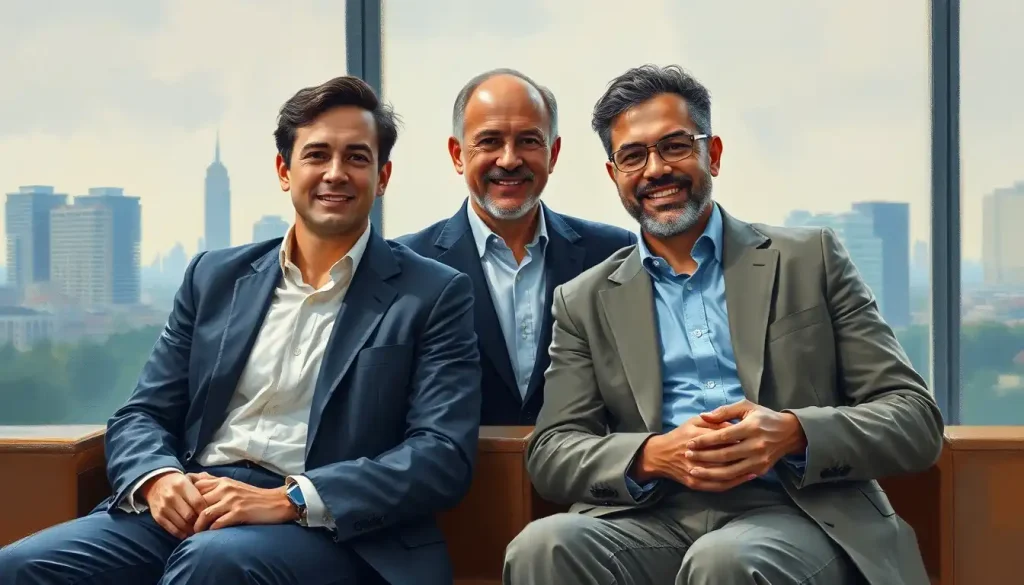From pioneering leveraged buyouts in the 1970s to orchestrating some of Wall Street’s most transformative deals, Thomas H. Lee Partners has redefined how private equity shapes the modern business landscape. This powerhouse firm has left an indelible mark on the industry, revolutionizing investment strategies and setting new standards for value creation.
Founded in 1974, Thomas H. Lee Partners, often referred to as THL, has become synonymous with innovation and success in the private equity world. The firm’s journey from a small Boston-based operation to a global investment titan is a testament to its founder’s vision and the team’s unwavering commitment to excellence.
The Mastermind Behind the Legacy
Thomas H. Lee, the visionary founder of THL, is a name that resonates throughout the corridors of Wall Street. His journey began far from the glittering skyscrapers of New York City. Born in 1944, Lee grew up in a family that valued education and entrepreneurship. These early influences would shape his future and set the stage for his remarkable career in finance.
Lee’s foray into the world of finance started with a bang. After graduating from Harvard University, he cut his teeth at L.F. Rothschild in Boston. It was here that he honed his skills and developed the keen eye for value that would become his trademark. But Lee was never one to rest on his laurels. He had bigger dreams, and in 1974, he took the bold step of founding Thomas H. Lee Partners.
The timing couldn’t have been more perfect. The 1970s marked the dawn of the leveraged buyout era, and Lee was at the forefront of this revolution. His approach was simple yet groundbreaking: identify undervalued companies, acquire them using a combination of debt and equity, improve their operations, and sell them for a profit. This strategy, now a cornerstone of private equity, was relatively novel at the time.
Lee’s impact on the private equity landscape cannot be overstated. He didn’t just participate in the industry; he shaped it. His deals became case studies, his methods were emulated, and his success inspired a new generation of investors. In many ways, the modern private equity industry owes its existence to pioneers like Thomas H. Lee.
A Strategy Built on Vision and Value
At the heart of THL’s success lies a robust and well-defined investment approach. The firm doesn’t cast a wide net; instead, it focuses on specific sectors where it believes it can add the most value. These core investment sectors include healthcare, financial services, technology, and business and consumer services.
But what sets THL apart is not just where it invests, but how it invests. The firm’s value creation methodology is a carefully crafted process that combines financial acumen with operational expertise. It’s not about quick fixes or short-term gains. THL takes a long-term view, working closely with management teams to drive sustainable growth and operational improvements.
Risk management is another crucial aspect of THL’s strategy. In the high-stakes world of private equity, where millions (if not billions) of dollars are on the line, managing risk is paramount. THL employs sophisticated risk assessment techniques, diversifies its portfolio, and maintains a disciplined approach to leverage. This careful balance of risk and reward has been key to the firm’s longevity and success.
What truly differentiates THL from other private equity firms is its collaborative approach. While some firms adopt a more hands-off stance, THL rolls up its sleeves and gets involved. The firm leverages its vast network of industry experts, operational specialists, and strategic partners to add value to its portfolio companies. This approach has earned THL a reputation as a true partner, not just a financial backer.
Transformative Deals That Shaped Industries
THL’s track record speaks for itself. The firm has been involved in some of the most high-profile acquisitions and exits in private equity history. One of its most notable deals was the acquisition of Houghton Mifflin in 2002 for $1.7 billion. THL saw potential where others saw risk, and their bet paid off handsomely when they sold the company to Riverdeep Group in 2006 for $4 billion.
Another landmark deal was THL’s investment in Snapple Beverages. Acquired for $135 million in 1992, THL worked closely with management to revamp the brand’s marketing strategy and expand distribution. The result? Snapple was sold to Quaker Oats just three years later for a staggering $1.7 billion, generating a return that became legendary in private equity circles.
These success stories aren’t just about impressive returns. They demonstrate THL’s ability to identify undervalued assets, implement strategic improvements, and create value for all stakeholders. The firm’s impact on its portfolio companies goes beyond financial metrics. THL has a track record of driving operational improvements, fostering innovation, and positioning companies for long-term success.
Going Global: THL’s International Expansion
While THL’s roots are firmly planted in Boston, the firm’s reach extends far beyond U.S. borders. Recognizing the opportunities in an increasingly globalized economy, THL has strategically expanded its international presence over the years.
This global expansion isn’t just about planting flags on a map. THL has developed sophisticated cross-border deal-making capabilities, allowing it to navigate complex international transactions with finesse. The firm’s approach to international investments is nuanced, taking into account local market dynamics, regulatory environments, and cultural factors.
THL’s international strategy isn’t about replicating its U.S. playbook in new markets. Instead, the firm adapts its approach to suit local conditions while maintaining its core principles of value creation. This flexibility has allowed THL to successfully execute deals across Europe, Asia, and beyond, further cementing its status as a global private equity powerhouse.
Navigating the Future of Private Equity
As the private equity landscape evolves, THL continues to adapt and innovate. The firm is keenly aware of emerging trends shaping the industry, from the rise of ESG (Environmental, Social, and Governance) considerations to the increasing importance of technology in value creation.
THL isn’t content to simply react to these changes; it aims to lead the way. The firm has been proactive in incorporating ESG principles into its investment process, recognizing that sustainable business practices are not just good for the planet, but also for long-term value creation. This forward-thinking approach mirrors the strategy of firms like LDC Private Equity, which has also been at the forefront of sustainable investing in the mid-market sector.
Technology is another area where THL is making significant strides. The firm has been increasing its focus on tech-enabled businesses, leveraging its expertise to help traditional companies navigate digital transformation. This strategy aligns with the approach of tech-focused firms like Thoma Bravo Private Equity, demonstrating THL’s ability to compete across diverse sectors.
Looking ahead, THL is well-positioned to capitalize on new opportunities. The firm’s deep industry expertise, coupled with its adaptable strategy, allows it to identify and pursue promising investments across various sectors. Whether it’s healthcare innovation, fintech disruption, or emerging technologies, THL is likely to be at the forefront of these exciting developments.
The THL Difference: A Culture of Excellence
What truly sets THL apart is not just its impressive track record or its strategic acumen, but its unique culture. The firm has cultivated an environment that values intellectual curiosity, collaboration, and continuous improvement. This culture permeates every aspect of THL’s operations, from deal sourcing to portfolio management.
THL’s approach to talent is particularly noteworthy. The firm doesn’t just hire financial whizzes; it seeks out individuals with diverse backgrounds and perspectives. This diversity of thought allows THL to approach problems from multiple angles, leading to more innovative solutions and better outcomes for its portfolio companies.
The firm’s commitment to developing its talent is equally impressive. THL invests heavily in training and mentorship programs, ensuring that its team members are always at the cutting edge of industry trends and best practices. This focus on continuous learning and development has allowed THL to maintain its competitive edge over the decades.
Beyond the Balance Sheet: THL’s Impact on Communities
While THL is primarily known for its financial prowess, the firm’s impact extends far beyond the balance sheet. THL has a long-standing commitment to corporate social responsibility and community engagement. The firm and its partners are actively involved in various philanthropic initiatives, supporting causes ranging from education to healthcare.
This commitment to giving back isn’t just about writing checks. THL encourages its employees to get involved in their communities, offering paid time off for volunteer work and matching charitable donations. This approach not only benefits the communities where THL operates but also fosters a sense of purpose and engagement among its employees.
THL’s community impact also extends to its portfolio companies. The firm encourages its investee companies to adopt responsible business practices and engage in their local communities. This holistic approach to value creation aligns with the strategies of firms like TJC Private Equity, which also emphasizes the importance of social responsibility in its investment philosophy.
The Road Ahead: Challenges and Opportunities
As THL looks to the future, it faces both challenges and opportunities. The private equity landscape is becoming increasingly competitive, with more firms vying for attractive deals. Additionally, regulatory scrutiny of the industry is intensifying, requiring firms to navigate a complex compliance landscape.
However, these challenges also present opportunities for a firm of THL’s caliber. The increased competition means that firms must differentiate themselves through their expertise and value-add capabilities – areas where THL excels. The regulatory environment, while challenging, also creates opportunities for firms that can navigate it effectively, potentially leading to more stable and sustainable business models.
Moreover, the current economic climate, characterized by disruption and transformation across industries, plays to THL’s strengths. The firm’s ability to identify undervalued assets, implement operational improvements, and drive growth positions it well to capitalize on these market dynamics.
Learning from the Best: THL’s Lessons for Investors
For investors looking to understand the private equity landscape, THL offers valuable lessons. The firm’s success demonstrates the importance of having a clear investment thesis, the value of sector expertise, and the power of a long-term perspective.
THL’s approach also highlights the importance of active ownership. Unlike passive investors, private equity firms like THL can drive significant value creation through operational improvements and strategic guidance. This hands-on approach, while resource-intensive, can lead to superior returns and more sustainable business models.
Another key lesson from THL’s playbook is the importance of adaptability. Over its nearly five-decade history, THL has navigated numerous economic cycles, industry transformations, and market disruptions. Its ability to evolve its strategy while staying true to its core principles has been crucial to its longevity and success.
The THL Legacy: Shaping the Future of Private Equity
As we reflect on THL’s journey from a Boston-based startup to a global private equity powerhouse, it’s clear that the firm’s impact extends far beyond its impressive financial returns. THL has played a pivotal role in shaping the private equity industry, setting new standards for value creation, and demonstrating the transformative power of patient capital.
Looking ahead, THL seems well-positioned to continue its legacy of innovation and value creation. The firm’s deep expertise, adaptable strategy, and commitment to excellence provide a solid foundation for future success. As the private equity landscape continues to evolve, THL is likely to remain at the forefront, driving innovation and setting new benchmarks for the industry.
For investors, portfolio companies, and the broader business community, THL’s journey offers valuable insights and inspiration. It’s a testament to the power of vision, strategy, and relentless execution. As we look to the future of private equity, firms like THL will undoubtedly continue to play a crucial role in shaping the business landscape, driving innovation, and creating value for all stakeholders.
In an industry where success is often measured in dollars and cents, THL’s true legacy may be the lasting impact it has had on companies, communities, and the very nature of private equity itself. As the firm continues to evolve and adapt, one thing remains certain: the Thomas H. Lee Partners story is far from over. The next chapter promises to be just as exciting and transformative as the last.
References:
1. Carey, D., & Morris, J. E. (2012). King of Capital: The Remarkable Rise, Fall, and Rise Again of Steve Schwarzman and Blackstone. Crown Business.
2. Gilligan, J., & Wright, M. (2014). Private Equity Demystified: An Explanatory Guide. ICAEW Corporate Finance Faculty.
3. Kaplan, S. N., & Strömberg, P. (2009). Leveraged Buyouts and Private Equity. Journal of Economic Perspectives, 23(1), 121-146.
4. Lerner, J., Hardymon, F., & Leamon, A. (2012). Venture Capital and Private Equity: A Casebook. John Wiley & Sons.
5. Thomas H. Lee Partners. (n.d.). Our Firm. Retrieved from https://www.thl.com/our-firm/
6. Baker, H. K., & Filbeck, G. (Eds.). (2017). Private Equity: Opportunities and Risks. Oxford University Press.
7. Gompers, P., Kaplan, S. N., & Mukharlyamov, V. (2016). What do private equity firms say they do? Journal of Financial Economics, 121(3), 449-476.
8. Invest Europe. (2020). Private Equity at Work. Retrieved from https://www.investeurope.eu/media/3321/invest-europe_private-equity-at-work_2020.pdf
9. Preqin. (2021). Global Private Equity & Venture Capital Report. Preqin Ltd.
10. Talmor, E., & Vasvari, F. (2011). International Private Equity. John Wiley & Sons.












Would you like to add any comments? (optional)